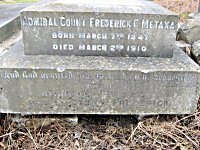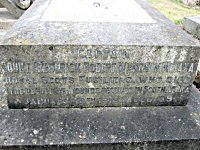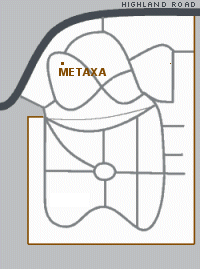 |
 |
|
|
ARMY AND NAVY
Count Frederick Cosmeto Metaxa, Admiral RN
Gravestone Inscription
BORN MARCH 7TH 1847
DIED MARCH 2nd 1910
"And God granted him that which he requested"
1 COR: 4.10
ALSO BLANCHE PRISCILLA
WIFE OF COUNT FREDERICK
CAPTAIN
COUNT FREDERICK ROBERT WYNDHAM METAXA
ROYAL SCOTS FUSILIERS WHO DIED
THE RESULT OF WOUNDS RECEIVED IN SOUTH AFRICA
JANUARY 18th 1918 AGED 39
The exotically named Frederick Cosmeto Metaxa is buried in the West Central (Q) Section of the graveyard. Born at Corinthian House, Bath Road, Cheltenham on 7th March 1847, Metaxa was the son of Jean Baptist Metaxa, 7th Count Metaxa-Anzolato, who became a naturalized British subject from the Ionian Islands, Greece in 1846, and Selina Jane Radcliffe Barrow.
The title of Count of the Venetian Republic was granted to Captain Anzola Metaxa by General Francisco Mauriceno, Doge of Venice on 12 July 1691, in recognition of his military and political services during the war with the Ottoman Empire in the Ionian Islands, Rumelia and Lavadia, in what is modern day Greece, having raised an army of several thousand men at his own expense. The title of Count was granted in perpetuity to all male heirs of his body and to all daughters, that of Countess, for life only. The title, being the equivalent of an Earl, was recognised by the British Government in 1840 enabling the holders to use the prefix of Count or Countess in this country.
Frederick Metaxa entered the Royal Navy in 1860 and served continuously until 1901. This period, Pax Britannica, was a period of unprecedented lack of naval engagement, with the exception of a small and brief incursion during the Russo-Turkish War in 1877-78 and the Bombardment of Alexandria in 1882. By contrast the period also saw considerable change in warship design with the introduction of steam propulsion, iron clad hulls and increasingly advanced and powerful armaments. Metaxa was promoted to Sub-Lieutnant in 1866 and Lieutenant in 1869 following service on HMS Zealous, Flagship of Vice Admiral George Hastings CB, Commander-in-Chief on the Pacific Station.
In 1877 Frederick Metaxa married Blanche Priscilla, daughter of the late Captain Robert Harris RN of Portsea who had been instrumental in implementing plans for providing naval officers with a proper education. They resided briefly at 42 Clarence Parade. Metaxa'a father-in-law set the tenure for much of the remainder of his career and, on his promotion to Captain in 1888, Metaxa spent his next ten years in command of cruisers on training squadrons before, finally, being appointed as Flag Captain to Vice Admiral Sir Compton Domvile KCB on the Battleship HMS Alexandra in 1898.
A sense of what Count Frederick Cosmeto Metaxa was like as a naval officer can be gleaned from the memoirs of Reginald Tyrwhitt, later Admiral of the Fleet, Bt, GCB, DSO, who served under Captain Metaxa as a Lieutenant during his command of HMS Calypso. Tyrwhitt describes him as "a martinet of the first order; punishments for the officers and men were very severe and usually unjust. When, in the course of manoeuvres 'war' was declared the Captain assembled the ship's company and announced during the period of 'hostilities' all punishments would be doubled. In these days (written 60 years later) no one would believe what went on in that ship. In spite of everything, however, the gunroom managed to be happy and even proud of their ship, which was the smartest in the squadron.
In common with many senior naval captains, of high birth, Count Frederick Metaxa was appointed Aide-de-Camp to Queen Victoria in 1899 and Edward VII in 1901 before being promoted to Rear Admiral and retiring in the same year. He received promotion to Vice Admiral in retirement in 1905. Metaxa moved to Weymouth and died in Menton on the Cote d'Azur, France on 2nd March 1910.
Captain Count Frederick Robert Wyndham Metaxa, son of Admiral Count Metaxa, was born in 1879 and entered the army in the 2nr Royal Scots Fusiliers. As a 2nd Lieutenant in 1900 he was part of the 6th Fusilier Brigade, under the command of Major General Barton, in the battle for Pieter's Hill during the Relief of Ladysmith. Casualties were considerable and Metaxa was one of those who was severely wounded. On 1st December 1910 Lieutenant Metaxa, on retired pay and a member of the Reserve of Officers, was granted by Royal Warrant the rank of Captain and employed as a Captain of Invalids at the Royal Hospital, Chelsea. He finally succumbed to his wounds on January 18th, 1918, aged 39.
Written by and copyright of John Ireland.


